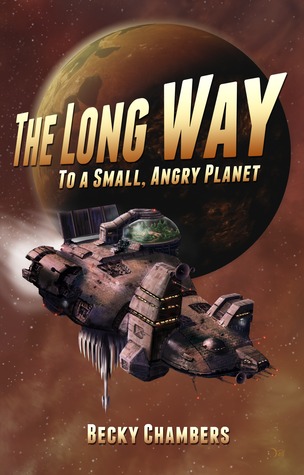The Long Way to a Small, Angry Planet is a story set in the far future. Rosemary Harper is running from her past, so she joins the crew of the Wayfarer, a ship that tunnels wormholes across the galaxy with its diverse crew of aliens. The crew is offered the chance of a lifetime: a new race is joining the Galactic Commons and the wormhole that needs to be tunneled will make them very wealthy, even if the job takes longer than usual. En route to the planet, the crew encounters a series of mishaps and hazards that bring them closer together. But the denizens of the planet might not be as keen to join the Commons as they initially seemed...
If plot's your thing, this may not be the book for you. This book is all about the journey and very much not about the destination. The book is more a series of vignettes focusing on each character, loosely threaded together by the fact that all the vignettes occur while en route to this planet to tunnel a wormhole.
In fact, the character diversity in this book is stunning. It's a frequent, if disappointing, trope in science fiction that alien races are simply re-skinned humans. They're not actually alien. But Chambers handles her alien races with a deft hand. Each race is distinctly different, with its own culture, language and variant physiology. We get everything from a feathered reptilian species to a species with two sets of vocal chords that changes gender mid-life to a sloth-like species with a willingly contracted virus that shortens their lifespans but grants them enhanced perception and mathematical abilities. And I've only scratched the surface here. The meticulous attention to species creation would set this book apart on its own.
Yet on top of that, Chambers juggles a large cast of main characters, managing to draw a compelling, three-dimensional picture of each one. As I said above, the story is told in vignettes, with each vignette focusing in on a particular character. None of them are skipped, and each one gets a chance to shine (even the curmudgeonly algaeist). Rosemary is technically our main character, but she really only feels that way in the early portions of the book as introductions are made; afterward, it's one of the best ensemble casts I've ever seen.
The worldbuilding too is well-executed. Chambers' future has weight and history, but also a fleshed-out set of cultures that permeate everything the characters do. It would've been easy to go thin on the worldbuilding since most of the book takes place on a ship, but instead the world enhances the emotional journeys of the characters.
In the end, the pacing is rather uneven as a result of the vignette style. But I'd still recommend this book as a shining example of character work and for its core message that family doesn't have to be who we're born with - we can choose our family too.
My rating: ★★★☆☆ (3 out of 5 stars) - I liked it.

No comments:
Post a Comment